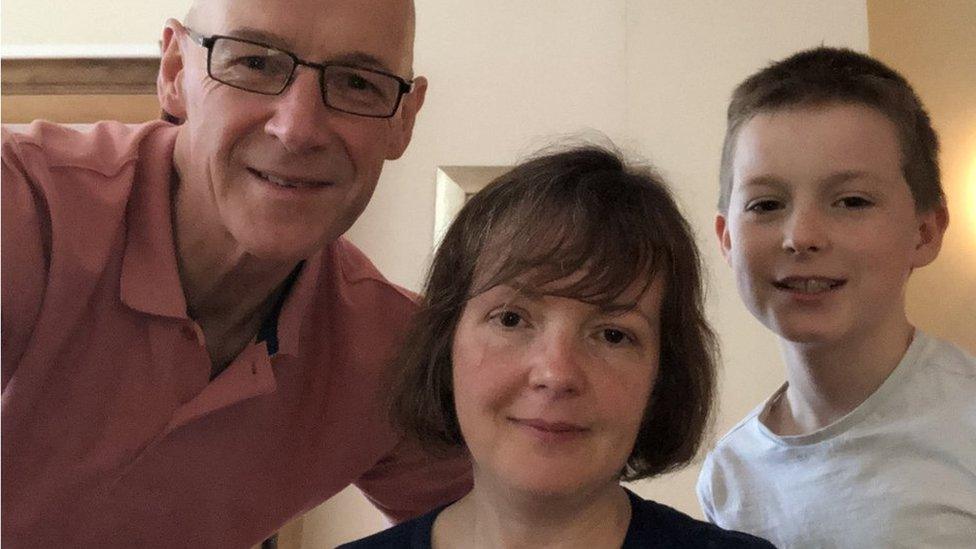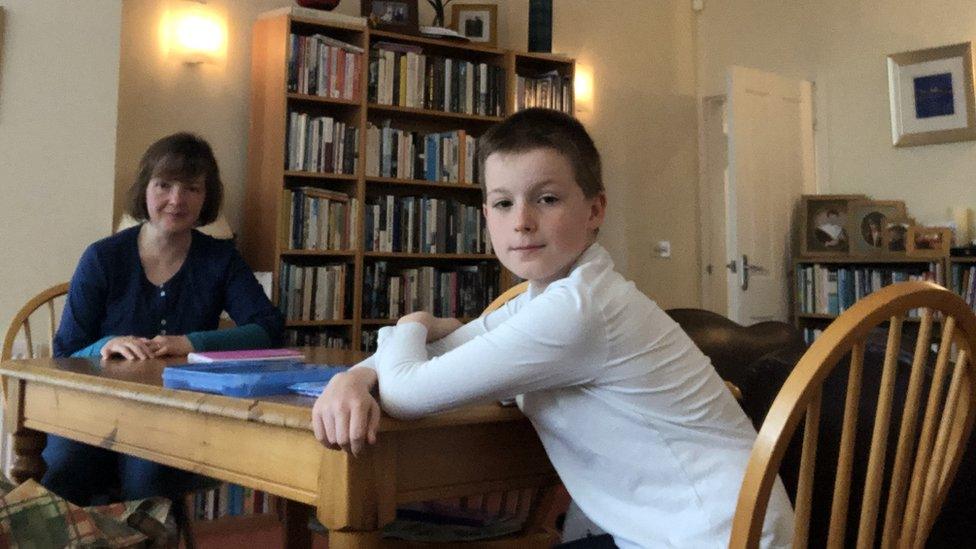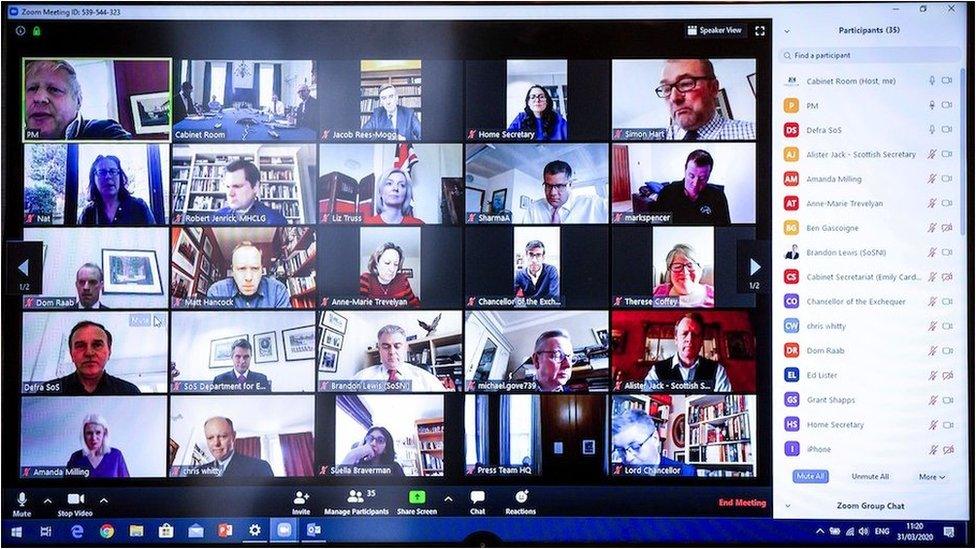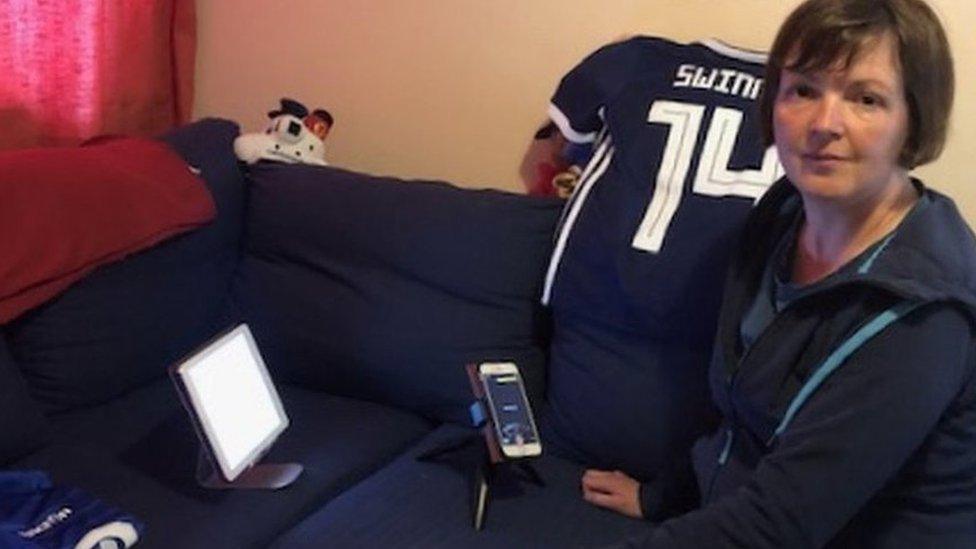Shielding: The terror of re-joining the outside world
- Published

Elizabeth with husband John Swinney and son Matthew
Everything changed for me on 5 April when I received a letter from the NHS and, along with about 180,000 others in Scotland, I had to get used to a new word: shielding.
The shielding group includes those who are at the greatest risk of becoming seriously ill with coronavirus.
I have secondary progressive Multiple Sclerosis and the treatment puts me into the highest risk category.
But now shielding restrictions have been greatly reduced and from next Saturday they will be "paused", ending months of official protective measures.
When the pandemic hit, the advice to shielders was to stay at home at all times and, even within the house, I was told to keep two metres away from my son and my husband.
I was advised to pack a bag in case I caught coronavirus and needed to go into hospital.
These were all sensible precautions but they were terrifying prospects when spelled out in black and white on official paper.
Like many others, the new routine offered fresh challenges, such as home-schooling, which came with extra challenges while shielding.

Elizabeth with nine-year-old Matthew, who has been home-schooled from a distance
My nine-year-old son Matthew and I sat at opposite ends of an extended table and talked through the day's timetable before starting each task.
And trying to find games to play while two metres apart was not easy either.
The game Guess Who worked really well, so did charades, but Subbuteo and Twister were just not designed to be Covid-19-proof.
And in our household having the Deputy First Minister, John Swinney, working in the next room added an extra layer of complication to an already tricky situation.
The route map to get the whole country safely out of lockdown was being worked on from a desk in the hall - while Matthew and I were in the living room next door concentrating on grammar and times tables. Or trying to.
With dad so close, it was too tempting for Matthew to ask for his help or show him his latest artistic endeavour.
"We need squared paper, Dad."
"Mum is using lined paper and it just doesn't work."
"Dad! Come and see where we're going on our virtual school trip."
"Dad! Are you still on the phone?"
When there was a UK or Scottish government video call about to take place, Matthew was warned not to walk through the hallway. But the warning did not always work.

Many UK and Scottish government meeting were held over video calls
"So that's what Boris Johnson looks like," Matthew said as he tiptoed back from some spurious excuse to get a snack from the kitchen.
Oh and I had to cancel one of his weekly virtual drumming lessons.
It was going to clash with the Scottish Cabinet discussion on coronavirus and I thought the background noise might just have been a bit too much for Nicola Sturgeon to deal with.
It reminds me of the story of Harold Macmillan, the Conservative prime minister in the 1950s and 1960s.
He often used to have his grandchildren over to visit him at Number 10. But he laid down some very clear rules to ensure family life could co-exist happily with government: on Cabinet days he banned his grandchildren from riding bicycles and tricycles In the front hall.
I suppose we are just living in a 21st Century version of these competing demands.
As lockdown started to be eased, I listened carefully to every announcement of the world starting to slowly open up.
And I added silently to myself "but not for me, not for me".
"And that's fine," I said.
When it was announced that shielding was being extended until the end of July, I breathed a sigh of relief.
I was not at all worried about being told to continue to stay at home.
I was terrified about the world opening up and being expected to join it but that is exactly what is happening now.
I'm sure many people who have been shielding are desperate to restart their lives.
But I cannot be the only one who is more than a little apprehensive.
So from 1 August, I will need to get used to some more new words: the outside world.
And see if I'm ready to join it again.
- Published2 May 2020
